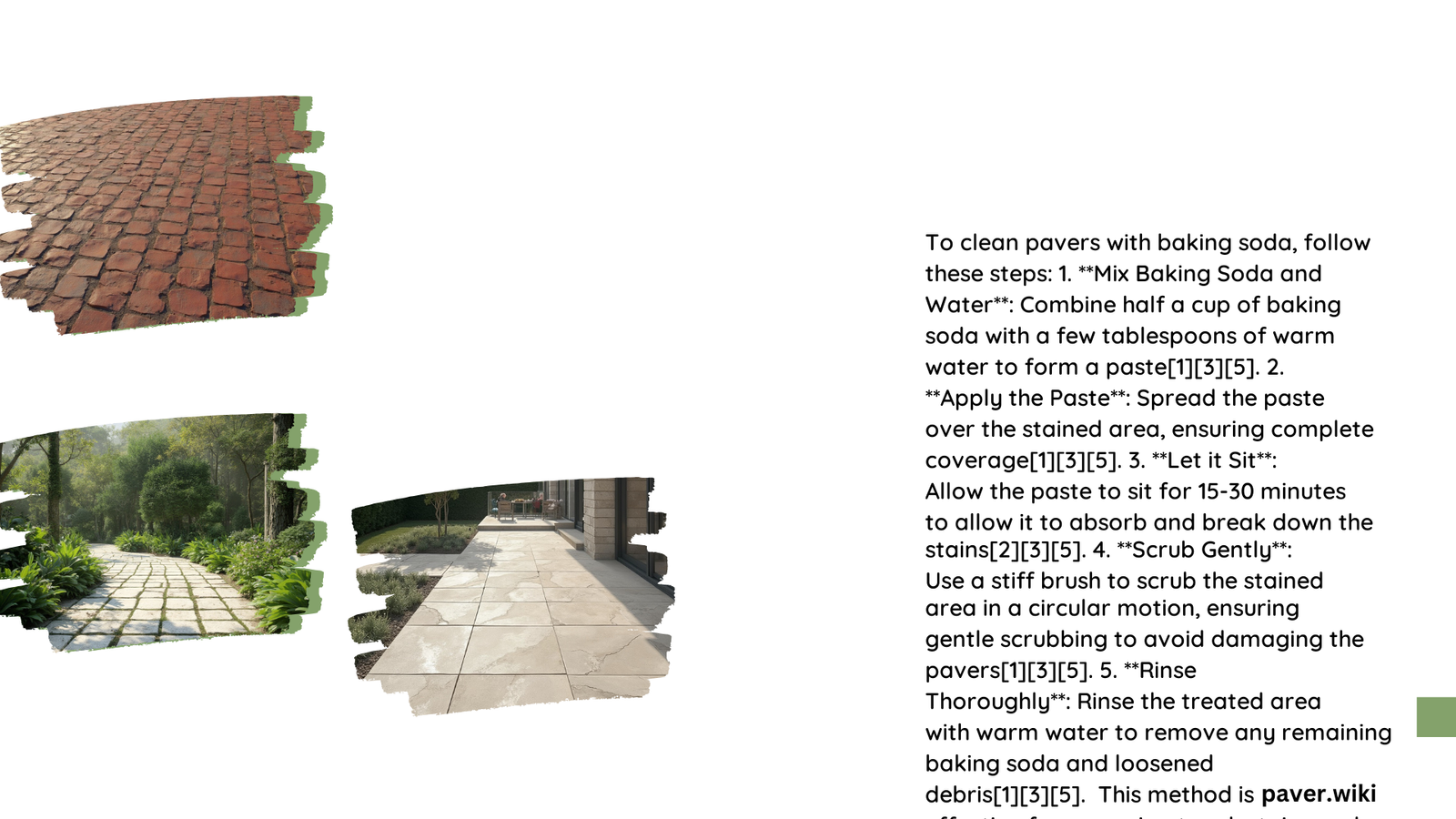Cleaning pavers with baking soda is an effective, eco-friendly method to remove stains and maintain the appearance of your outdoor surfaces. This natural cleaning solution is gentle yet powerful, capable of tackling various types of dirt and grime. By using baking soda, you can avoid harsh chemicals while achieving excellent results in restoring the beauty of your pavers.
What Makes Baking Soda an Effective Cleaner for Pavers?
Baking soda, or sodium bicarbonate, is a versatile cleaning agent with mild abrasive and alkaline properties. These characteristics make it ideal for cleaning pavers:
- Gentle Abrasiveness: Helps scrub away dirt without damaging paver surfaces
- Alkaline Nature: Effective in breaking down organic stains and neutralizing acidic substances
- Deodorizing Properties: Eliminates odors often associated with dirty or moldy pavers
- Environmentally Friendly: Safe for plants and pets, unlike many chemical cleaners
How to Prepare a Baking Soda Solution for Paver Cleaning?

Creating an effective baking soda solution for cleaning pavers is simple and cost-effective. Here are two methods:
- Baking Soda Paste:
- Mix equal parts baking soda and warm water
-
Example: 1 cup baking soda + 1 cup warm water
-
Baking Soda Solution:
- Combine 1 cup baking soda with 1 gallon of water
- Ideal for larger areas or general maintenance
What Are the Steps to Clean Pavers with Baking Soda?
Follow these steps to effectively clean your pavers using baking soda:
- Sweep the paver surface to remove loose debris
- Apply the baking soda paste or solution to stained areas
- Scrub gently with a stiff-bristled brush or sponge
- Let the solution sit for 15-30 minutes
- Rinse thoroughly with clean water using a garden hose
- Repeat if necessary for stubborn stains
Which Types of Stains Can Baking Soda Remove from Pavers?
Baking soda is effective against various types of stains commonly found on pavers:
| Stain Type | Effectiveness | Additional Notes |
|---|---|---|
| Oil and Grease | High | Absorbs and lifts residues |
| Moss and Mildew | Moderate to High | Antimicrobial properties help |
| Organic Stains | High | Breaks down leaf, grass, and food stains |
| Rust | Moderate | May require multiple applications |
| Efflorescence | High | Helps neutralize mineral deposits |
How Often Should You Clean Pavers with Baking Soda?
The frequency of cleaning pavers with baking soda depends on various factors:
- Regular Maintenance: Monthly cleaning with a mild baking soda solution
- Heavy Traffic Areas: Bi-weekly cleaning may be necessary
- Stubborn Stains: As needed, but avoid over-scrubbing
- Seasonal Cleaning: Deep clean at the beginning of spring and end of fall
What Are the Advantages of Using Baking Soda Over Chemical Cleaners?
Choosing baking soda for paver cleaning offers several benefits:
- Cost-Effective: Inexpensive compared to specialized paver cleaners
- Versatile: Effective on various paver materials (concrete, brick, natural stone)
- Safe for Plants: Won’t harm surrounding vegetation
- Non-Toxic: Safe for pets and children
- No Harsh Fumes: Pleasant to use without respiratory irritation
- Environmentally Friendly: Biodegradable and doesn’t pollute water systems
Are There Any Precautions When Cleaning Pavers with Baking Soda?
While baking soda is generally safe, consider these precautions:
- Test First: Always test on a small, inconspicuous area before full application
- Avoid Overuse: Excessive use may lead to residue buildup
- Weather Conditions: Avoid cleaning in extreme heat or cold
- Protective Gear: Wear gloves to protect hands during scrubbing
- Rinse Thoroughly: Ensure all baking soda is removed to prevent white residue
What Additional Tools Are Needed for Baking Soda Paver Cleaning?
To effectively clean pavers with baking soda, gather these tools:
- Broom or leaf blower for initial debris removal
- Bucket for mixing the baking soda solution
- Stiff-bristled brush or scrub brush
- Garden hose with spray nozzle
- Protective gloves
- Optional: pressure washer for stubborn stains or large areas
How Does Baking Soda Compare to Other Natural Paver Cleaning Methods?
Baking soda stands out among natural cleaning methods for pavers:
- Vinegar: Less effective on alkaline stains, may etch some paver types
- Lemon Juice: Good for small areas, but can be costly for large surfaces
- Hydrogen Peroxide: Effective bleaching agent, but may discolor some pavers
- Salt: Can be abrasive and potentially harmful to vegetation
Baking soda offers a balance of effectiveness, safety, and affordability compared to these alternatives.
What Is the Cost Analysis of Cleaning Pavers with Baking Soda?
Using baking soda for paver cleaning is cost-effective:
- Baking Soda Cost: $5-$10 for a 4-pound bag
- Coverage: One bag can clean approximately 200-300 square feet of pavers
- Comparison: Commercial paver cleaners can cost $20-$50 for similar coverage
- Additional Savings: Reduces the need for professional cleaning services
How Can You Enhance the Cleaning Power of Baking Soda for Pavers?
To boost the cleaning effectiveness of baking soda on pavers:
- Add Vinegar: Create a foaming action for tough stains
- Incorporate Dish Soap: Increases grease-cutting power
- Use Hot Water: Helps dissolve stubborn dirt and grime
- Combine with Hydrogen Peroxide: Enhances bleaching effect for severe stains
- Pre-treat with Baking Soda: Apply dry baking soda before the wet solution
By following these tips and techniques, you can effectively clean pavers with baking soda, maintaining their appearance and prolonging their lifespan without resorting to harsh chemicals or expensive professional services.
